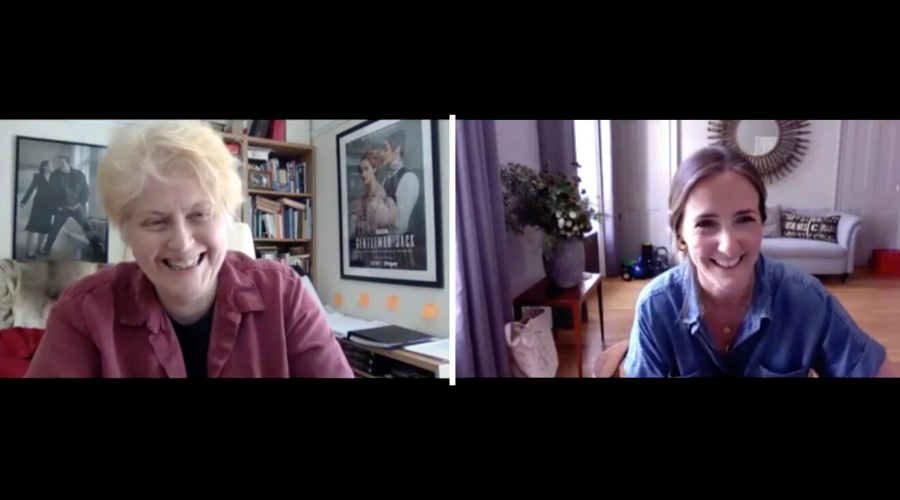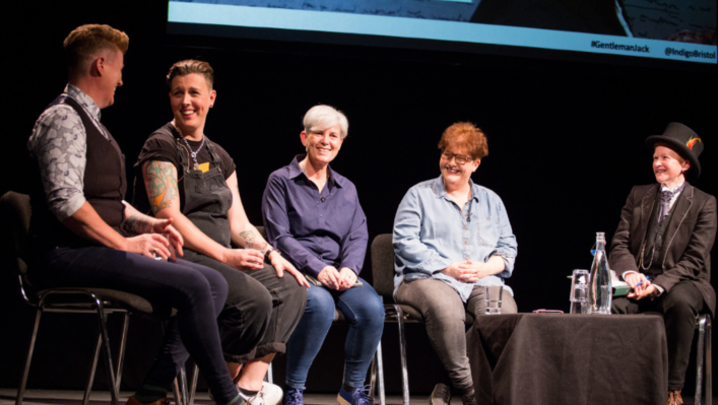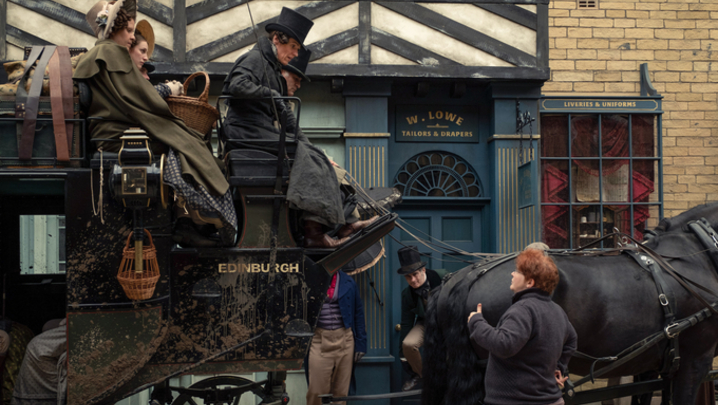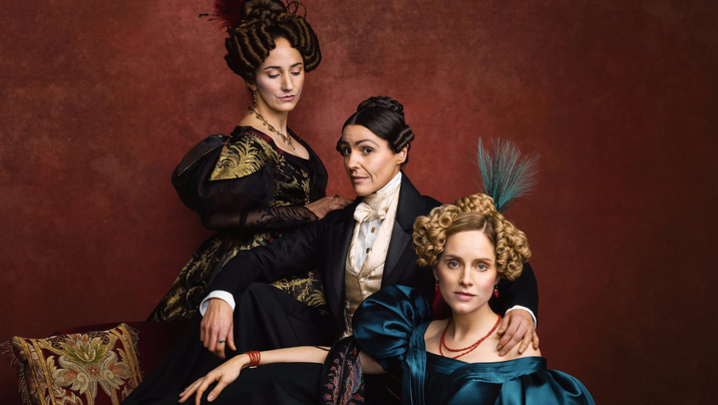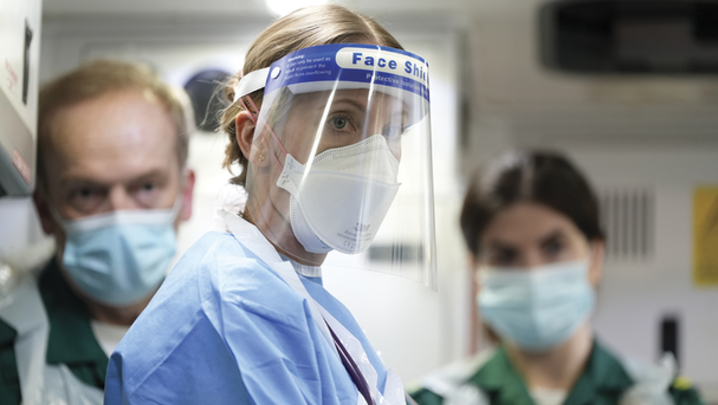Sally Wainwright, busy on season two of Gentleman Jack, tells the RTS why her work has to be grounded in reality
It is doubtful whether Sally Wainwright’s writing has ever been described as inauthentic – her TV drama is populated with real people, speaking natural, colloquial English. “My imagination doesn’t seem to click in if what I’m writing doesn’t feel real, or if it’s phoney, or if something feels a bit cheesy or sentimental,” she told Endemol Shine UK COO Lucinda Hicks, who hosted an RTS webinar with the writer in May.
Discussing her work, Wainwright said: “I hope it’s down to earth and feels authentic.” But in her hands – unlike gloomier dramatists – authentic should not be read as dour. “I hope everything I do is funny, even when it’s very dark, like Happy Valley. It’s always important for me to entertain people,” she said.
Happy Valley, which starred Sarah Lancashire as a Yorkshire police sergeant, gave Wainwright some of the best reviews of an award-laden career that began, on radio, with The Archers in the late 1980s and then, on television, with Coronation Street, in 1994.
“I can’t remember not writing,” said Wainwright who, as a child, turned out stories and cartoon strips with her sister. In her early teens, Thames TV’s musical drama Rock Follies of ’77 “had a really profound effect on me”, she recalled. “I remember being so excited about the show and tangibly thinking that’s what I’m going to do – I’m going to make television programmes.”
Wainwright “learned a heck of a lot” as a writer from The Archers and Corrie. “Particularly on Coronation Street, some of those writers had been there 20, 30 years and they were very, very skilled storytellers.
“I didn’t speak. I was shy – I could write – but for the first few years I didn’t contribute, which is not good for your self-esteem. But I did soak it all up.”
She added: “[Soaps] are a fantastic place to start. It always makes me laugh when young people want to work in Hollywood and they believe writing soaps is a pile of junk. And you just think, ‘[They] don’t know anything’.”
Wainwright left Corrie when her first original series, ITV lottery comedydrama At Home with the Braithwaites, starring Amanda Redman, took off. “It was a fantastic experience, but it kind of spoiled me,” she admitted.
‘I’ve got tons of work to do, but I’ve found it very hard to concentrate’
Her follow-up, BBC One’s Sparkhouse, a modern retelling of Wuthering Heights, brought Wainwright back to earth: “I was really pleased with it, but nobody watched it and it got not very good reviews. I was really shocked.
“We’ve all written turkeys, but it is hard because you put just as much effort into things that people don’t get. People say, don’t take it personally, but writing is personal – you can’t not take it personally.”
Until she penned Scott & Bailey, Wainwright admitted that she had prided herself “up until that point for not writing a cop drama, because it seemed to be such a big part of [TV drama’s] output”.
But, having met detective inspector Diane Taylor, who co-created the series, Wainwright realised that real-life police work was very different to its usual TV portrayal. “It’s not about an inspector and his sergeant sidekick who solve everything together. A murder squad is a big team of 20 to 30 people. I felt I’d never seen that on telly, although, retrospectively, I thought Prime Suspect did that really, really well.”
Scott and Bailey, played by Lesley Sharp and Suranne Jones, were the stars of the show but also part of a larger team of detectives. “We wanted [it] to reflect what solving murders is really like,” continued Wainwright. “We make entertainment out of murder on TV a lot of the time – the Agatha Christie tradition of solving whodunnits, middle-class murders. Real murders aren’t like that – they’re very grim.”
But the subject matter of the ITV drama began to weigh heavily. “By series 3, I was starting to feel quite depressed,” Wainwright recalled. It lifted when she started to write Last Tango in Halifax: “I had this absolute buzz of delight and that made me realise that it was the nature of the [Scott & Bailey] material that [was having] an effect on me.
“It was quite relentlessly [focusing on] the real sad and dark side of human nature. I’m very proud of Scott & Bailey and I enjoyed writing the scripts, [but] I wouldn’t want to repeat it.”
Last Tango in Halifax, she revealed, was based on her mother’s life, who – like Celia (played by Anne Reid) in the BBC drama – discovered and married a lost love after being widowed. “My mum was thrilled that I’d dramatised what had happened to her. She met someone online who she’d been at school with 60 years ago and they fell in love with each other and got married.… She loved the show.”
Sadly, the screenwriter’s mother now has dementia and was unable to watch this year’s fifth series. “She’s always watched everything I’ve written. She would have given me the best feedback and wouldn’t tell me something was good if it wasn’t.”
Wainwright is currently penning the second series of the RTS award-winning BBC drama Gentleman Jack, which is based on the diaries of Anne Lister, a 19th-century landowner who explored her lesbian sexuality.
Progress, however, has been slow. “I’ve got tons of work to do, but I’ve found it very hard to concentrate,” admitted Wainwright. She has turned out one episode during eight weeks of lockdown, a slow pace for her.
Normally, she said, “I take my deadlines very seriously”, although the coronavirus crisis has delayed filming from June to September.
Talking about her personal lockdown in rural Oxfordshire, she said: “I feel guilty for saying it’s really not that bad. As a writer, you spend most of your time on your own, anyway – I could very happily be a recluse, so this isn’t any real hardship for me.
Lockdown has allowed her, for the first time in years, to garden and grow vegetables. “It sounds really glib, but I’ve enjoyed being at home for a consistent period of time,” she said. “The hardest thing [about lockdown] for me is that my mum is in a care home, so I haven’t seen her for eight weeks.”
Looking ahead, Wainwright wants to “challenge myself, whether that’s to write or direct for theatre or film”. But, she added, “It’s finding time. I’ve got about 10 projects on my books at the moment and I can only work on one at once. It’s why I can’t direct [Gentleman Jack] this time – I’ve got too many stories I want to tell.”
Despite having received a “few offers” from the US, Wainwright is staying put: “I love British telly; I love writing in my own vernacular.
“American culture is significantly different to ours. Again, it comes down to authenticity: I’m sure I could have a crack at it and get away with it, but I wouldn’t want to get away with it.
“I want to write scripts that have depth and resonance and, if you’re imitating a voice, which I think I would be, I don’t know that it would feel real. You can sniff it out when an English person has written an American script.”
Report by Matthew Bell. The RTS webinar ‘In conversation with Sally Wainwright’ took place on 18 May and was produced by Sarah Booth and Lucinda Hicks.

